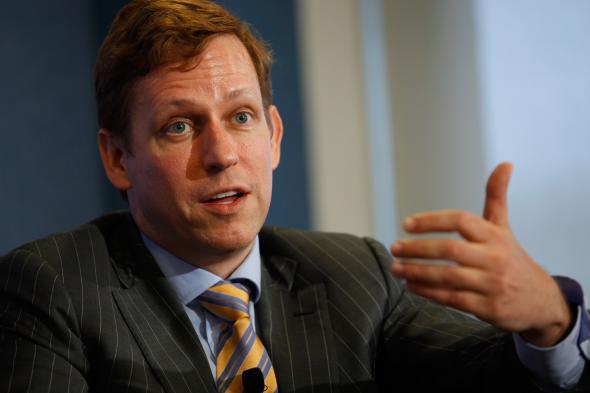A day after Gawker founder Nick Denton told the New York Times he had a “personal hunch” that someone linked to Silicon Valley was funding the onslaught of lawsuits against Gawker Media—which resulted in a potentially destructive $140 million award to Hulk Hogan—Forbes is reporting that Peter Thiel, the billionaire founder of Paypal and early backer of Facebook, is the one who has been quietly bankrolling Hulk Hogan’s legal crusade against Gawker. The Forbes report linking Thiel to Hogan is anonymously sourced.
Hulk Hogan, whose real name is Terry Bollea, won the whopping $140 million jury award in March for Gawker’s 2012 publication of a sex tape featuring Hogan and the wife of his best friend. Gawker is challenging the suit on the grounds that information was improperly withheld from the jury. Earlier this month, Hogan sued Gawker again. But why would a tech billionaire be out to get Gawker?
From Forbes:
Money may not have been the main motivation in the first place. Thiel, who is gay, has made no secret of his distaste for Gawker, which attempted to out him in late 2007 before he was open about his sexuality. In 2009, Thiel told PEHub that now-defunct Silicon Valley-focused publication Valleywag, which was owned by Gawker, had the “psychology of a terrorist.”
It’s not illegal or unheard of for someone not involved in a legal proceeding to bankroll a case. The practice of “third-party litigation funding,” however, usually is a financial agreement aimed at generating large returns from any potential award in return for cash to litigate the case. There were several moves throughout the Hogan case and in subsequent suits that indicated some level of retribution may be at play.
First, the lawyer for Hulk Hogan, Charles J. Harder, was representing the former wrestler on a contingency basis, which means that some portion of his compensation for representing Hogan would be a share of the judgment. Harder, however, turned down multiple offers to settle by Gawker, which is highly unusual for a lawyer working on a contingency agreement, and he intentionally maneuvered during the case to make it such that Gawker’s insurance coverage wouldn’t cover the site’s legal fees, which would also presumably reduce the size of a potential award, as well as Harder’s cut.
Here’s more from the New York Times on the appearance of a third party funder:
As for the lawsuits against Gawker Media, “the evidence has built up over time that there are questions that are unanswered here,” Mr. Denton said. “The data point that really got us thinking was the move that they made on insurance, which seemed designed to prevent insurance paying for our defense.” Mr. Denton is referring to a decision by Mr. Hogan’s legal team to abruptly drop one of the claims — for “negligent infliction of emotional distress” — from its case. That claim had a particularly special meaning: It was the one claim that required Gawker’s insurance company to pay for its defense as well as potential payouts in the case of a settlement. (That provision of Gawker’s insurance policy became public after the insurance company, Nautilus, sued Gawker to try to limit payment for defense.)
Harder has also filed multiple similar suits against Gawker.
